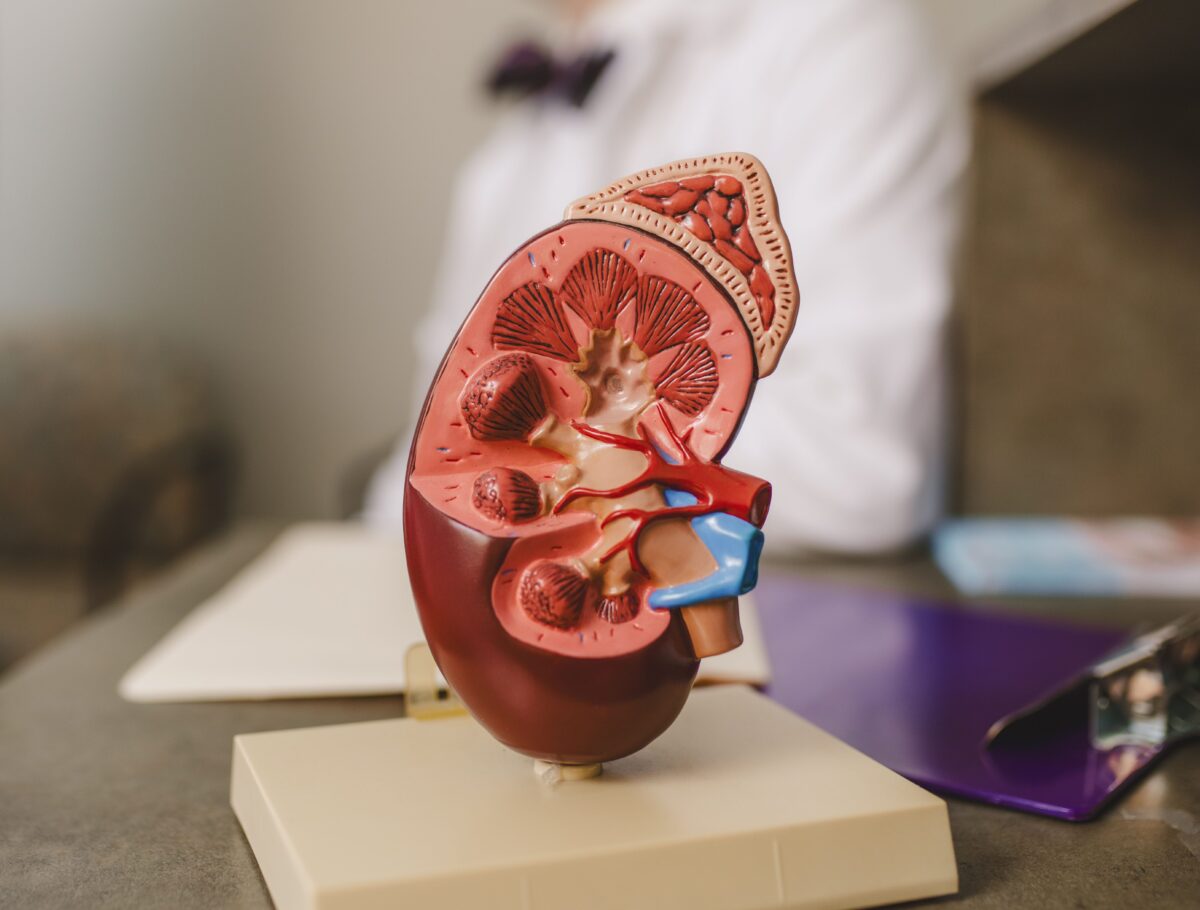
Our team is committed to provide excellent, up-to-date, compassionate care.
Our integrated team of physicians, advanced nurse practitioners, nurses, dieticians, social workers and staff are here to assist you in the complex care of kidney disease.
We offer a multitude of kidney services and specialize in treating the following.
Select any of our services and specialties below to learn more.
Acute Kidney Injury (AKI) is a rapid deterioration of renal function over the course of several days to weeks. The condition can be life-threatening and requires immediate treatment to obtain the best results. There are many possible causes of acute kidney injury or sudden damage of the kidney’s filtering units including a reduction in blood flow or low blood volume caused by dehydration, medications and heart failure. ales common cause of AKI is a disease known as glomerulonephritis or GN. Glomerulonephritis is defined as damage of the kidney filtration units called glomeruli. Damage to the glomeruli can affect the kidney’s ability to function and lead to the loss of protein, blood, and white cells in the urine. GN may be caused by a very large number of genetic, autoimmune disorders such as systemic lupus erythematosus, vasculitis, multiple myeloma, amyloidosis or primary glomerular disorders. Patients may develop sudden onset of swelling (anasarca), increased foam in the urine (proteinuria) or notice blood in the urine (hematuria). These findings may be associated with sudden elevation in blood pressure, significant drop in urine output, or progressive weakness and shortness of breath. The development of GN may require emergent hospitalization, urgent dialysis support and medical therapy. A kidney biopsy (PDF) ![]() may be required to help identify the cause and tailor aggressive therapy to reverse kidney damage.
may be required to help identify the cause and tailor aggressive therapy to reverse kidney damage.
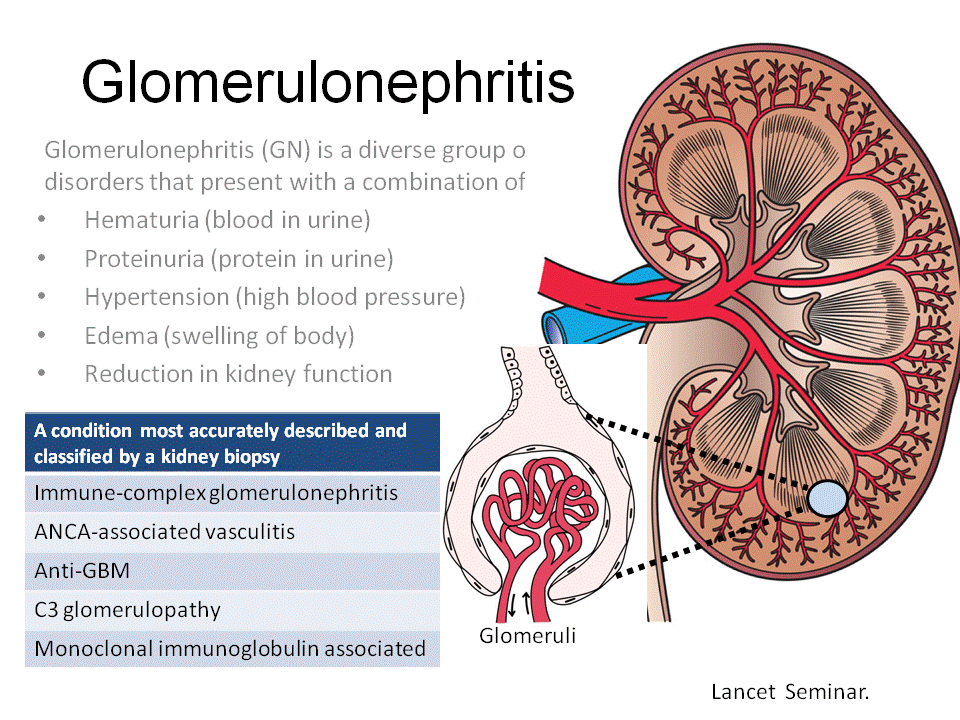
CT Kidney and Hypertension has hospital privileges in the leading hospitals in the central and northwest CT and will coordinate your care and management efficiently and collaboratively. Follow-up care with a nephrologist after a hospitalization for acute kidney injury is important for patient safety and prevents further kidney damage.
Roughly 1 in 8 people living in the United States will develop Chronic Kidney disease (CKD). Chronic Kidney Disease is characterized by the gradual, irreversible loss of kidney function over time. It affects 26 million Americans and millions of others are at risk. Chronic Kidney Disease may lead to additional complications like high blood pressure, anemia, weak bones, poor nutritional health and nerve damage.
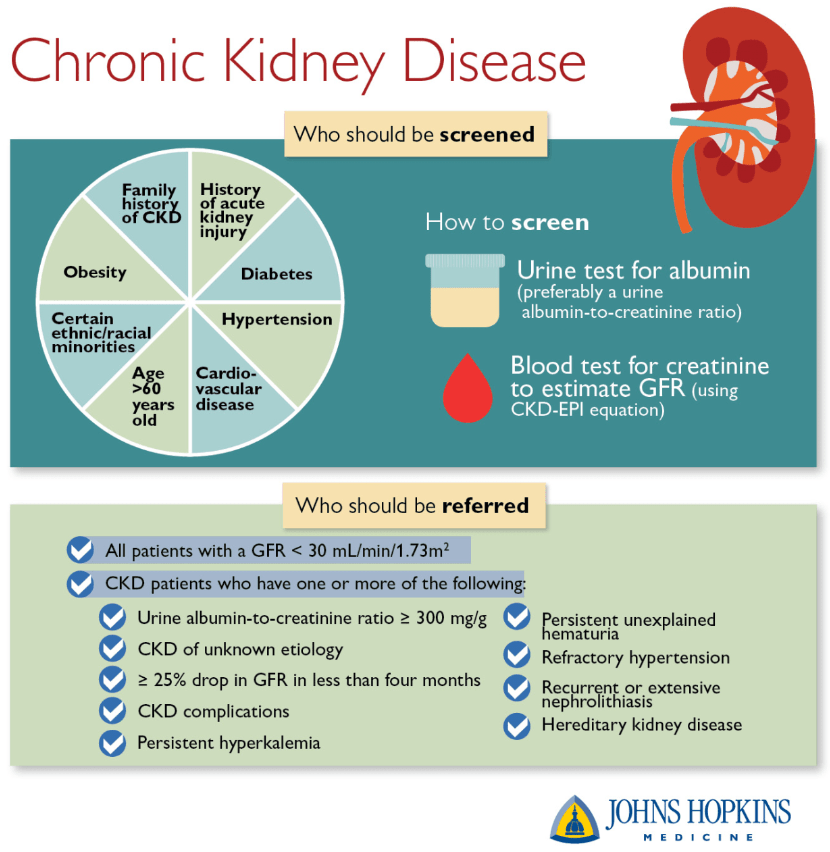
If untreated, CKD increases the risk of cardiovascular disease and may progress to End Stage Kidney Disease or kidney failure and require dialysis support or a kidney transplant.
There are five stages of chronic kidney disease, classified estimated glomerular filtration rate (eGFR) which correlates to kidney function. CKD is typically defined as having eGFR or kidney function below 60.
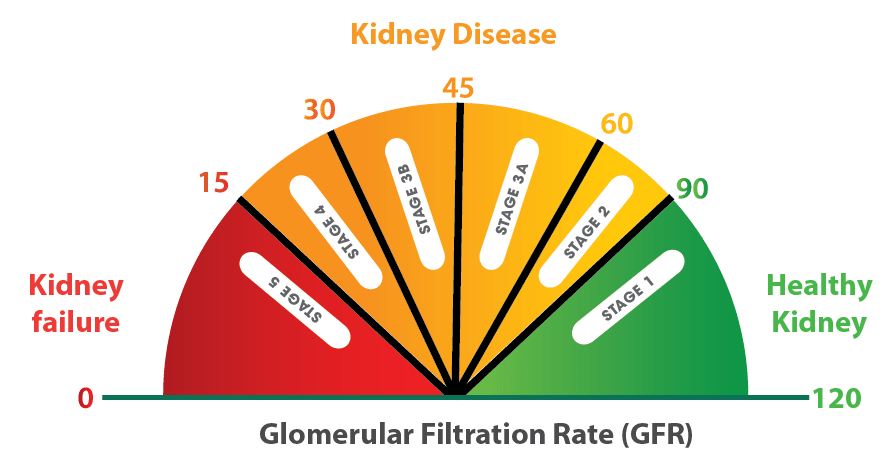
CT Kidney and Hypertension works with your primary provider to diagnose and treat chronic kidney disease early, in an effort slow the progression of disease. If Chronic Kidney Disease progresses to later stages – emphasis will continue to prevent progression and includes monitoring for potential complications of worsening kidney disease and help prepare for for kidney transplantation or renal replacement dialysis support.
Anemia is a condition in which a patient’s blood deficient in red blood cells or hemoglobin. Erythropoietin, the hormone that makes red blood cells, is made by the kidney. Patients who develop CKD or worsening renal function commonly develop gradual anemia, especially as renal function declines below eGFR 30cc/min. Anemia reduces the ability of blood to carry oxygen, and as anemia worsens patients may develop symptoms. These symptoms include, feeling tired, shortness of breath, poor exercise performance, chest pain or congestive heart failure, lightheadedness, and abnormal thirst. Additionally the building block for red blood cells is iron. As patients develop worsening renal function, absorption nutritional iron is impaired and patients with chronic kidney disease are prone to develop iron–deficiency anemia.
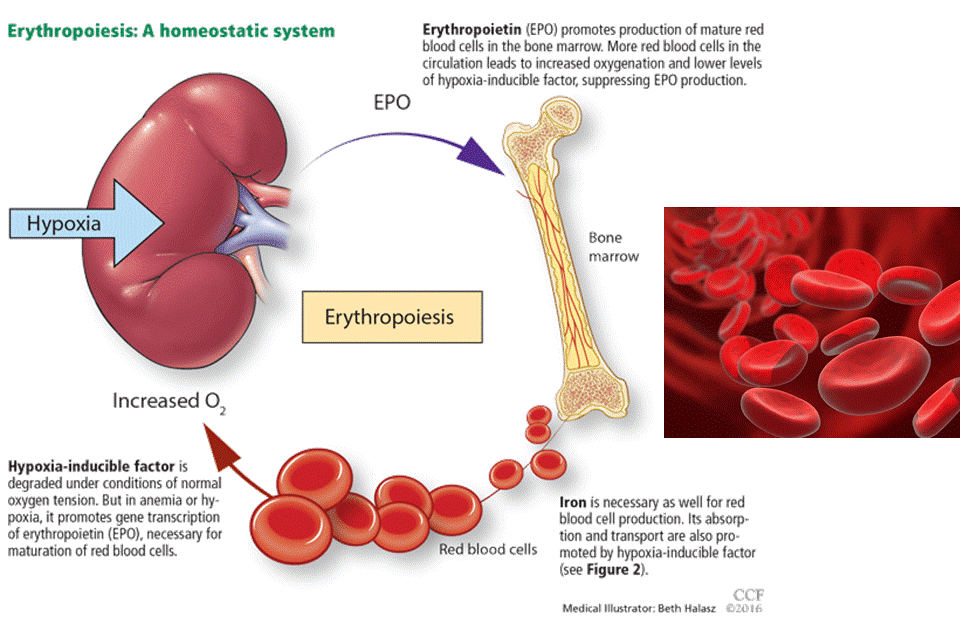
source: Cleveland Clinic Journal of Medicine
CT Kidney and Hypertension Specialists offers a specialized Anemia Management Clinic where we evaluate your condition and assess the need for Erythropoietin, a hormone that your healthy kidney produces to make blood, along with intravenous or iron tablets which will help to stimulate your kidneys to make more red blood cells. This is monitored under the guidance of the nephrologist or a hematologist with a carefully designed protocol to ensure your hemoglobin levels improve and are maintained effectively between 10 mg/dl-12 mg/dl.
Diabetic nephropathy or diabetic kidney disease is a common complication of Diabetes type 1 and type 2. Over time, especially in poorly controlled diabetics, diabetics with uncontrolled hypertension or patients with genetic predisposition, diabetes can cause damage to the blood vessels and filtering units of the kidney. Roughly, one out of every 3 patients with diabetes mellitus in the United States suffers from some form of diabetic kidney disease. Diabetic nephropathy is one of the most common causes of kidney failure or end stage kidney disease. Even well controlled diabetes over the course of many years can slowly damage the kidney.
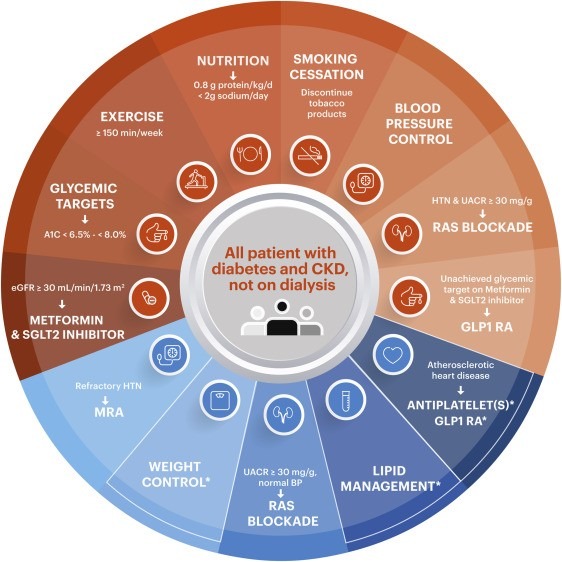
source: American National Kidney Foundation
Early treatment and prevention may reduce the risk of complications. CT Kidney and Hypertension Specialists will develop a customized plan with the patient, endocrinologist and primary care physician with specific attention to diabetic therapies that are safe and protective. Attention at kidney disease optimization of diet and blood pressure lowering therapy, along with improving cardiovascular and cholesterol health, weight reduction and prevention of potential complications of progressive chronic kidney disease is paramount.
The body is composed largely of water and specific minerals or electrolytes that are important for homeostasis or balance of the body’s chemistry to allow cells, tissues and organs to work effectively. The most common electrolytes in the body that can be altered from kidney disease, chronic illness, medications or genetic disorders include Sodium, Potassium, Bicarbonate, Calcium, Magnesium, and Phosphorus. These electrolytes may become too low or too high and the imbalance of these electrolytes can affect normal physiology and lead to additional complications. Metabolic acidosis is the loss of a major anion called bicarbonate. Hyperkalemia is the elevation of potassium beyond 5.2meq/dl and Hypokalemia refers to low total potassium levels less than 3.5meq/dl. Hyperphosphatemia is a reflection of elevated phosphorus accumulation in the body and Hypophosphotemia reflects a low total phosphorus content of < 3.5meq/dl. Hypercalcemia or elevated calcium is potentially dangerous and is identified in patients with Calcium levels exceeding 10.2-10.5meq/dl, while hypocalcemia or Calcium levels below 7.5meq/dl represent total calcium deficit in the body. Lastly, Magnesium depletion or Hypomagnesemia reflects a loss of total magnesium stores generally below 1.5meq/dl.
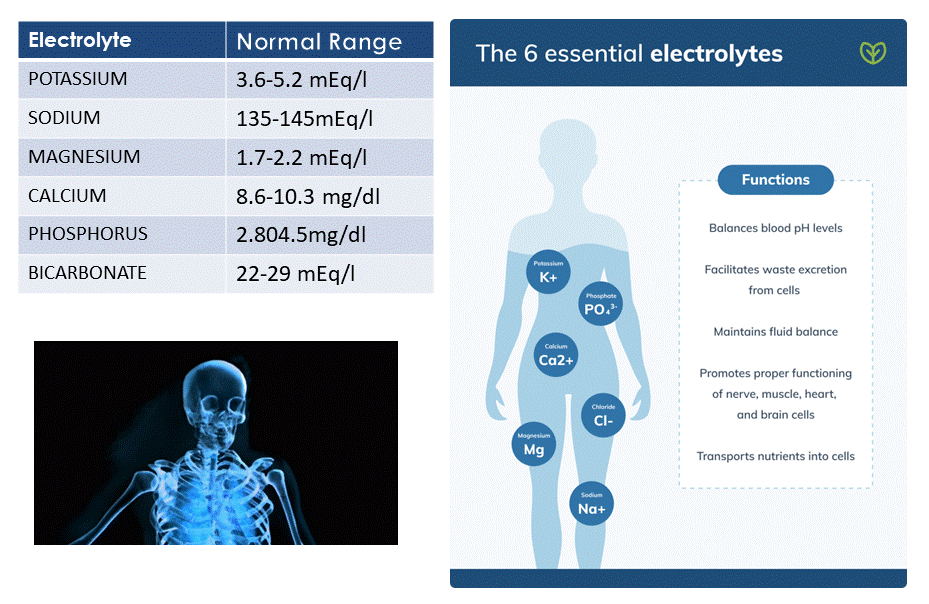
Nephrologists at CT Kidney and Hypertension have specialized training and experience to help identify the causes of electrolyte abnormalities and provide solutions to quickly correct and normalize electrolytes levels to ensure proper cellular and organ function.
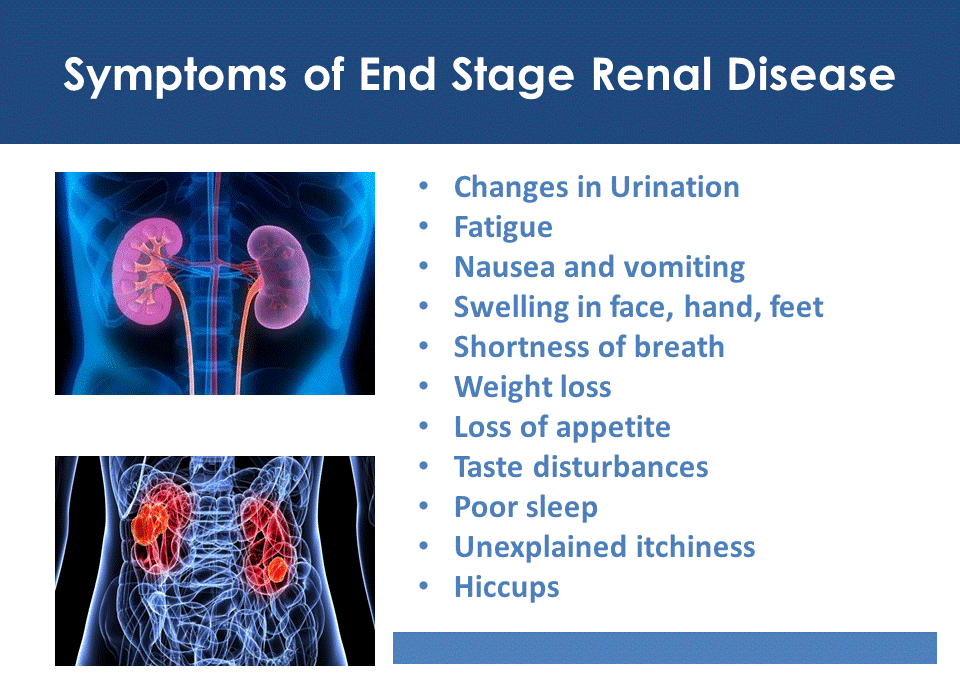
End Stage Renal Disease (ESRD) is when the kidneys stop functioning well enough for someone to live without dialysis support or a transplant. People with diabetes or high blood pressure and progressive renal diseases are at increased risk to suffer from ESRD. Regular checkups like blood tests for GFR and urine tests can help the patient know his or her condition and prepare for the potential of kidney failure. Our team at Connecticut Kidney and Hypertension Specialists in conjunction with our dialysis partners at three central convenient centers help patients with ESRD in the following ways:
- Dialysis Options and CKD Kidney Patient Education is provided on a one on one format with our nurse practitioner, physician assistant educators to help patients understand the functions of the kidney, dialysis options and alternatives to dialytic support including non dialytic support and transplant.
- Patients who receive education are generally much happier with their choice of dialysis and studies suggest educated patients have a prolonged survival.
- Conducting regular hemodialysis with services offered at home or in center, depending on the patient’s preference
- Peritoneal Dialysis – manual and automated dialysis services at home
- Kidney Transplant Management – Pre and Post Kidney Transplant Care
- Home dialysis
Hypertension or High Blood Pressure in adults is defined as a blood pressure at home consistently over 130/80 and above 140/90 in the office setting. Hypertension is the second leading cause of ESRD and it is commonly known as a chronic medical condition. High blood pressure can damage the blood vessels in the kidneys and eventually contribute to chronic kidney disease. Hypertension can equally promote increased risk of congestive heart failure, atrial fibrillation, coronary artery disease, aneurysm formation, progressive dementia and stroke risk. Patients with difficult to control hypertension or treatment resistant hypertension often have identifiable causes, which require coordinated care for diagnosis and therapy.
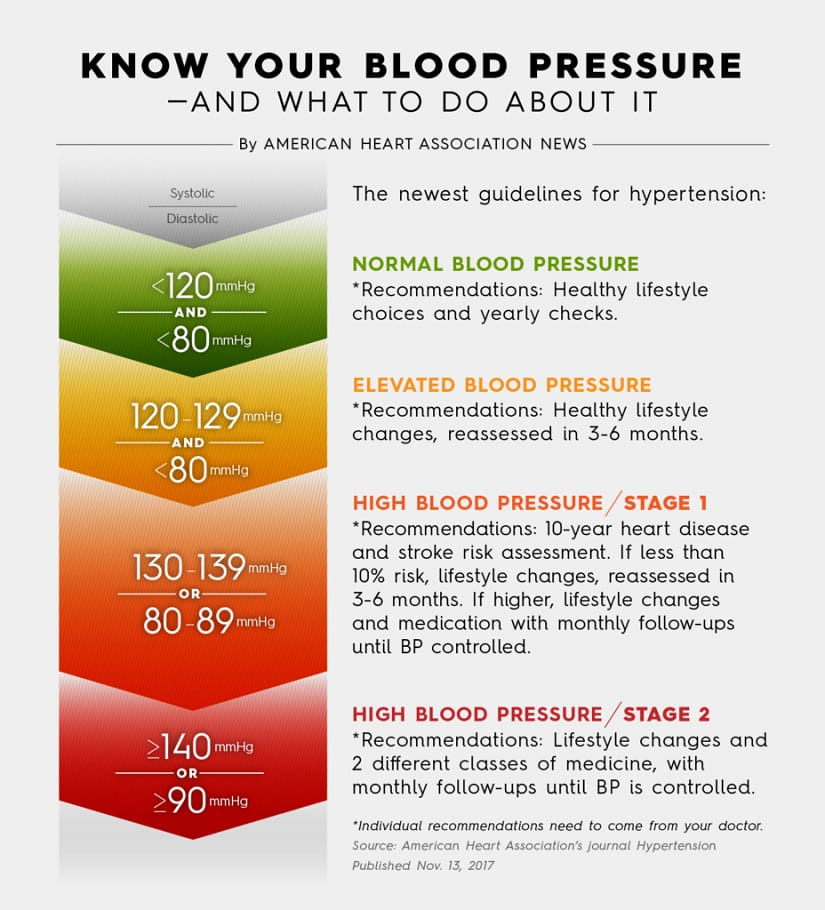
source: American Heart Association
At CT Kidney, we specialize in evaluating the cause of hypertension and have specialized training in the management of genetic induced HTN or secondary HTN therapy. In addition to genetic screening and hypertension screening, our focus is the management of secondary hypertension and patients with difficult to control blood pressure. A careful balance of dietary, natural remedies and medication regimen may be required while balancing medication side effects, cost, interactions and efficacy. Additionally, we can provide 24-hour ambulatory blood pressure monitoring and home blood pressure automated monitoring to better assess BP control and tailor medications more efficiently and effectively to achieve target blood pressure.
1 in 10 individuals experience kidney stones in their lifetime.

The common treatments for kidney stones involve hydration, pain medication, and time. In severe cases, other methods of treatment involve medication to speed the passage of urinary stones, ESWL (Extracorporeal Shock Wave Lithotripsy), and/or surgery. The risk of kidney stone recurrence is quite high.
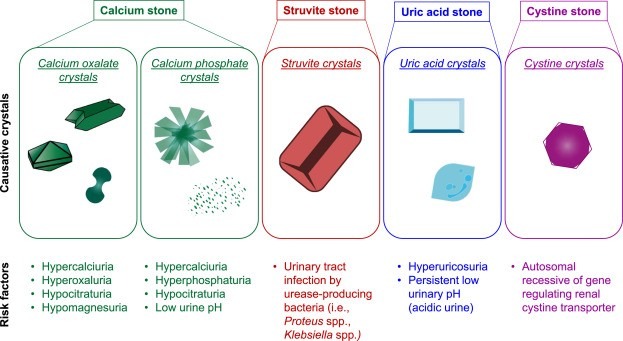
With the help of a thorough evaluation, review of imaging, analysis of the stone type and 24 hour urine collection – stone evaluation is performed. CT Kidney and Hypertension Specialists will work with your Urologist to offer you comprehensive care for identifying the type and cause of kidney stones and offer dietary advice, natural remedies, and or medical therapy to help resolve and prevent further stone formation.
Pregnancy is an exciting time, but sometimes renal disorders and conditions such as hypertension and eclampsia may develop or worsen during pregnancy. Women suffering from kidney disease or experiencing complications during pregnancy can deliver a healthy baby with the help of their obstetrician, maternal fetal physician and their kidney specialists.
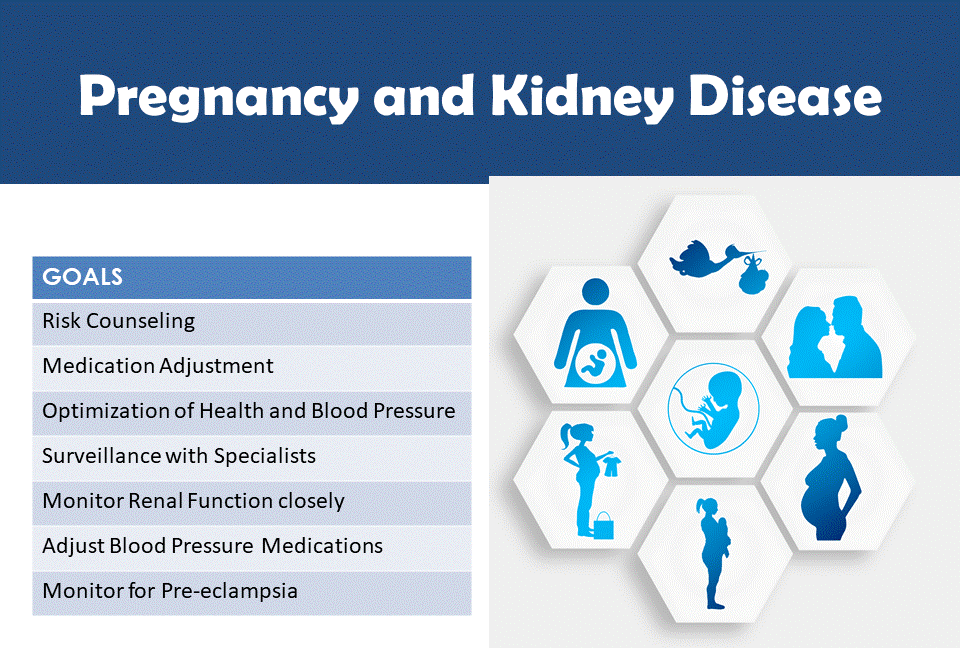
CT Kidney works closely with your obstetrics team and maternal fetal physician to define your condition and assist in the management during and after the pregnancy to help ensure the health and wellness of both the mother and baby.
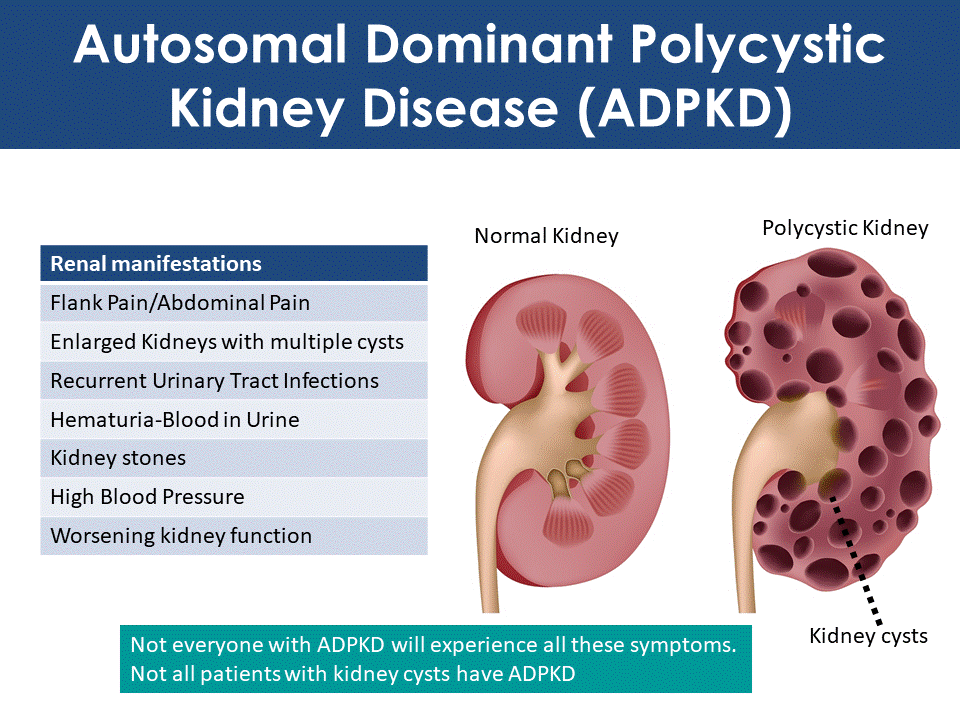
Cysts on the kidneys can be a benign part of the aging process, or may represent a much more debilitating disease. Over the last few years, genetic testing and new therapeutics have allowed nephrologists to use genetic testing to identify and potentially treat less common genetic renal diseases including:
- Adult Polycystic Kidney Disease
- Fabry’s Disease
- Cystinosis
- Alport’s Syndrome
To date, there are over 300 genetic disorders of the kidney, many are rare and may affect other organs. There are now newer pharmaceutical therapies to help manage these potential life altering diseases. CT Kidney performs genetic testing, renal testing and kidney biopsies to help identify unique, poorly described kidney diseases that fail to meet the typical pattern. State of the art therapies are available with certain conditions and exciting medical breakthroughs have changed the nature of these unique diseases.
If medically eligible, kidney transplantation may offer an advantage over dialysis for patients who suffer CKD Stage 5 or End Stage Renal Disease (ESRD). Studies indicate that people with a kidney transplantation live longer than patients that remain on dialysis. On the other hand, having a kidney transplant requires anti-rejection medications which have an increased risk of infection, cancer, or eventual damage to the transplanted kidney or alternative organ. Although most transplants are highly successful and can last for many years, the longevity of the transplant will vary.
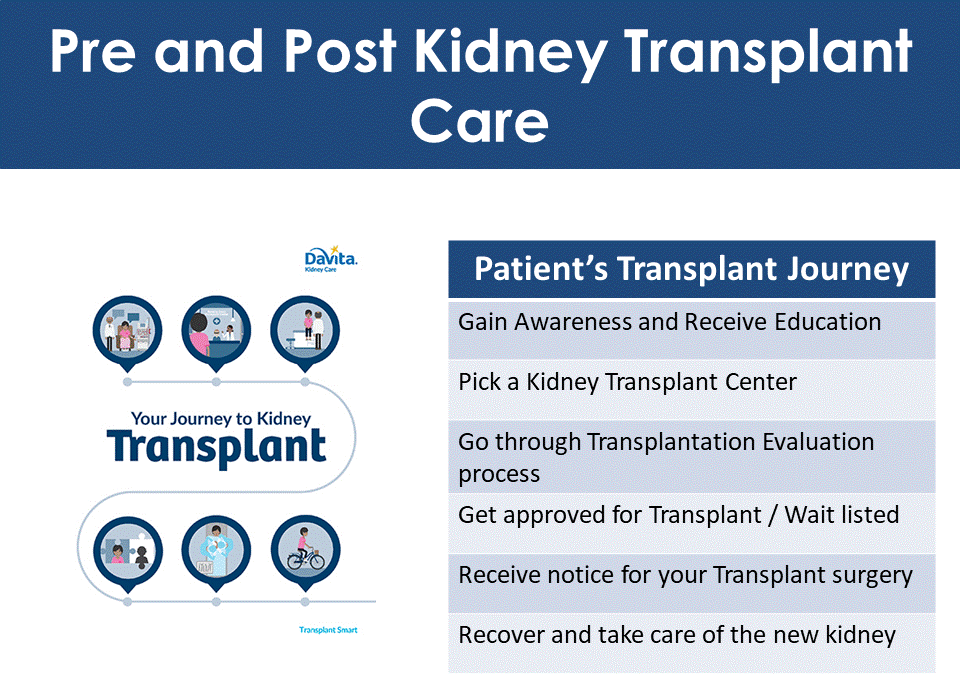
Transplant centers in the area will work with you to help determine your eligibility and review the risks of immunosuppression and potential complications associated with kidney transplant. CT Kidney is proud to work closely with Hartford HealthCare Transplant Center, Yale University Hospital Transplant Program, and other area transplant centers to educate, prepare patients for transplant and participate in post transplant care.
Many patients are referred to us by their primary care provider because they are concerned about blood or protein in their urine. The kidney filtering units called glomeruli are naturally designed to prevent protein and blood from spilling into the urine. Often these findings can be the first signs of kidney disease and occasionally if proteinuria is elevated greater than 300mg/dl – these findings may suggest a greater chance of progressive kidney disease. Many of these conditions are treatable and if detected early will not lead to long term kidney disease. Additionally, proteinuria and hematuria or blood in urine may be extraglomerular or not involve the kidney directly.
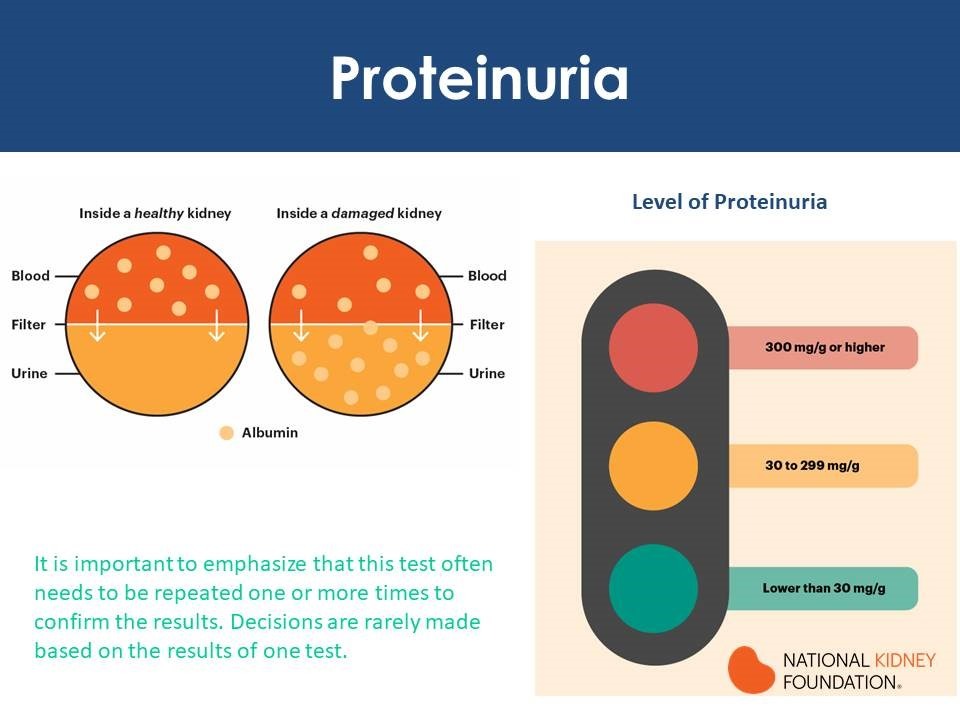
At CT Kidney, we work with your primary care physician, urologist and our radiology colleagues to better define the causes of proteinuria, hematuria or edema (swelling in the body).
Patients improve their outcome with our unique, patient-centered education sessions.
At Connecticut Kidney and Hypertension Specialists, we offer an extensive education program that helps patients with advancing chronic kidney disease to improve their lives. We have designed unique, patient-centered education sessions to help patients better understand kidney disease and help prepare for the future. Patients who receive education are better prepared to start dialysis if necessary, and some may delay needing to start dialysis or avoid dialysis altogether. Patients and families who receive education are more satisfied with their healthcare experience. Education sessions are held in a private comfortable office setting, led by our nurse practitioner.
These one-on-one sessions allow the educator to connect personally with each patient and meet their individual needs. Ask your physician about which sessions are right for you.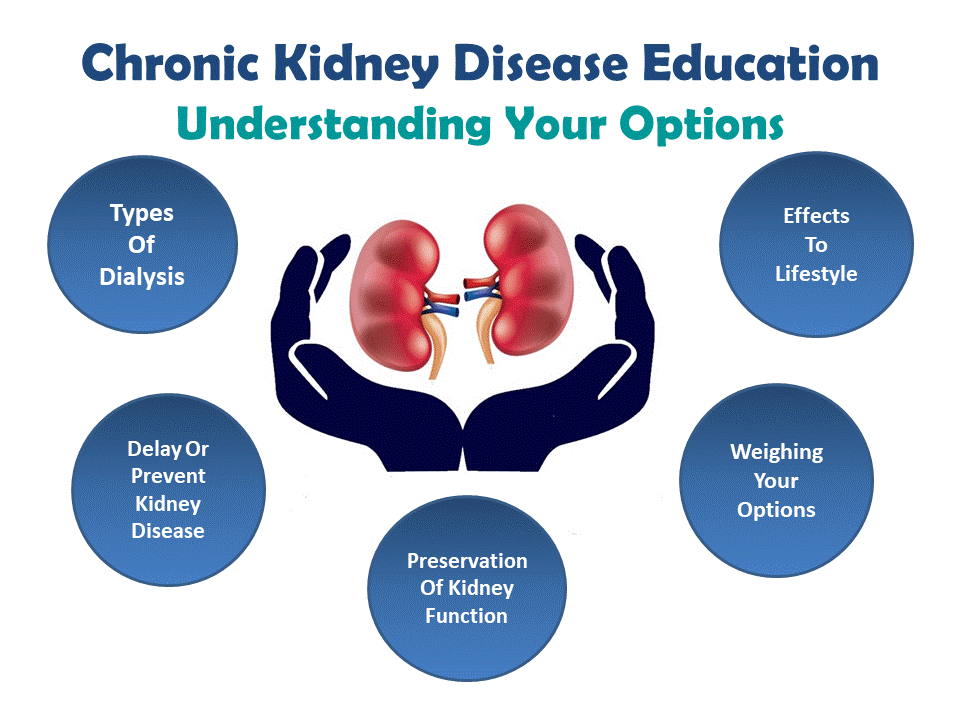
Education Sessions:
1) Chronic Kidney Disease – How Can I Protect Myself?
Introduction to Chronic Kidney Disease- How the kidney works. A closer look at Medications, Diet & Lifestyle changes to protect the kidney.
2) Advanced Kidney Disease – Creating a Safety Net
Understanding the various dialysis modalities- Peritoneal dialysis, home hemo dialysis, in center hemodialysis and general introduction to kidney transplant.
3) Renal replacement therapy and dialysis access – Next Steps
Understanding how Dialysis works and next steps required to establish dialysis access.
4) Living Well with Your Choices – Informed Decisions and Conservative Treatment
Understanding Goals of Care Discussion and alternative approaches to dialysis.
5) Is Kidney Transplantation Right for You?
Introduction to Kidney Transplantation, review the steps to receive a kidney transplant and what post transplant care is involved.
6) Putting it All Together – Kidney Care Review
Review and creating a complete and comprehensive care plan if renal replacement is needed.
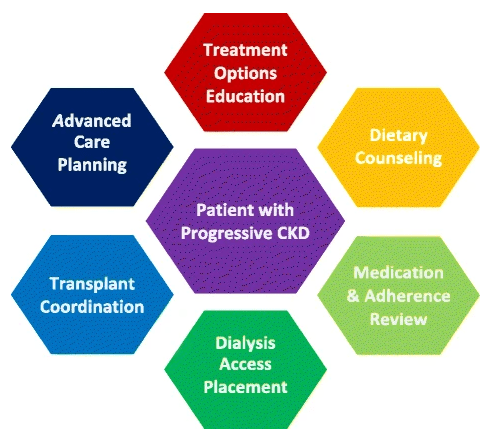
source: BioMed Central
Wellness Support
Our team will support you in building a healthier you. No matter what your health needs are, having a team support you will keep you on the path to meeting them. We work together to connect you with the services you need.
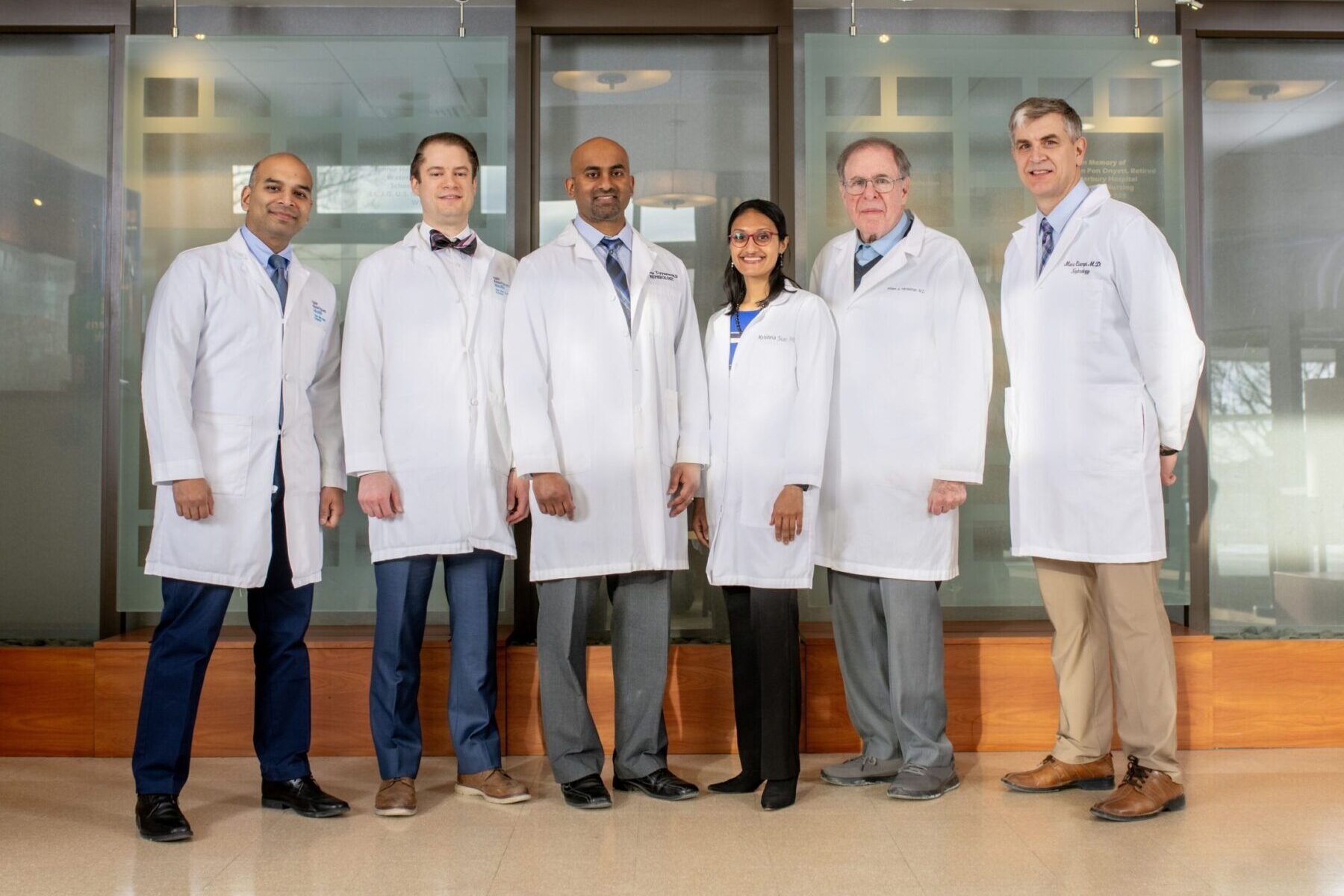
A Healthy Community
When you choose us, you join a community. We work not just with you but with other members of our community to build a network of people working together for a healthier world.

